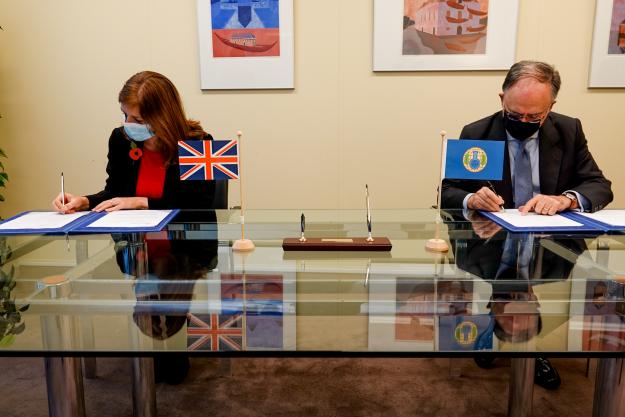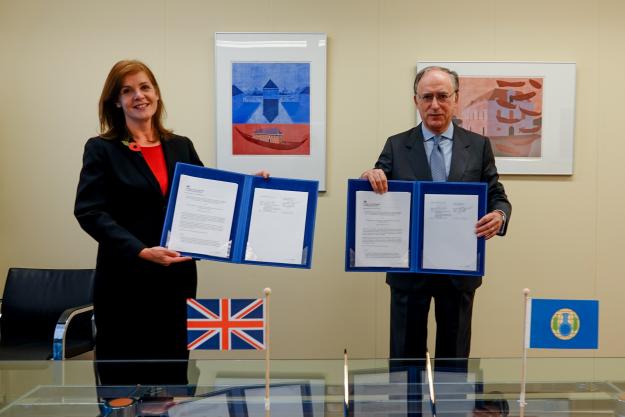
THE HAGUE, Netherlands–6 November 2020–The Government of the United Kingdom of Great Britain and Northern Ireland has made two contributions totalling £1M to a special Organisation for the Prohibition of Chemical Weapons (OPCW) Trust Fund to support a number of major projects and activities of the Organisation.
A contribution of approximately £700,000 (€774,000) will support the activities of the Trust Fund for Security and Business Continuity. The funding will allow the OPCW to keep enhancing its cyber resilience from a security and business continuity perspective thus ensuring the Organisation is well prepared to meet current and future challenges.
Another contribution of £300,000 (€332,000) will be made to the OPCW Trust Fund to support the upgrade to the current OPCW Laboratory and Equipment Store through the construction of a new Centre for Chemistry and Technology (“ChemTech Centre”).
The contribution was formalised today during a ceremony between the Permanent Representative of the United Kingdom to the OPCW, H.E. Ambassador Ms Joanna Roper CMG, and OPCW Director-General, H.E. Mr Fernando Arias, which was held at OPCW Headquarters in The Hague.
Ambassador Roper remarked: “I am delighted that one of my first tasks as the UK’s Permanent Representative to the OPCW is to agree a further UK voluntary contribution of £1m to OPCW programmes. This funding will go towards the ChemTech Centre and cybersecurity, and the UK is pleased to support these valuable strands of OPCW work.”
The Director-General thanked the UK Government for the contribution and expressed: “Our aspiration for a world free of chemical weapons can only become reality through concerted institutional action. I am grateful to the United Kingdom for its continued support, notably for the two important projects that underpin our strategic vision for remaining fit-for-purpose guardians of the global chemical weapons ban.”
Director-General Arias appealed to all OPCW Member States in a position to make voluntary contributions to do so. He further emphasised the important role the new ChemTech Centre will play in strengthening the OPCW’s ability to address chemical weapon threats and enhance capacity building activities. He highlighted that “all contributions, regardless of size, are greatly appreciated”.
So far, 45 countries, the European Union, and three other donors have contributed or pledged to contribute financially to the ChemTech Centre project, and a considerable amount has been raised to date.

Background
The Trust Fund for Security and Business Continuity helps the OPCW to enhance its cyber resilience to ensure the Organisations people, operations and information are protected effectively. Furthermore, to deal with business continuity events and maintain availability of critical services, the OPCW has been working to ensure greater resilience for its information systems for both its current operations, as well as the future ChemTech Centre.
The project to build the ChemTech Centre is on-going and seeks to strengthen the OPCW’s capabilities to fully address new and emerging chemical weapons threats, as well as to support capacity building in OPCW Member States. The current OPCW Laboratory and Equipment Store are central to the effectiveness and integrity of the verification regime of the Chemical Weapons Convention, and they also contribute to the OPCW’s capacity-building and international cooperation activities. However, the current facility will soon no longer be fit-for-purpose due to its ageing infrastructure, space constraints, larger workloads, and new missions with new areas of work.
A new facility is required to meet the demands of OPCW Member States for enhanced verification tools, improved detection capabilities and response measures, as well as increased capacity-building activities. The ChemTech Centre will also help the OPCW to keep pace with developments in science and technology and new chemical weapons threats. The OPCW Technical Secretariat is developing a detailed project plan for the construction of the ChemTech Centre, and a Trust Fund for voluntary contributions has been established to secure the required resources for the project.
To date, the following Member States have contributed or pledged to contribute to the project: Algeria, Andorra, Angola, Australia, Bangladesh, Belgium, Canada, Chile, China, Cyprus, Czech Republic, Estonia, Finland, France, Germany, Greece, Hungary, Indonesia, Ireland, Italy, Japan, Kazakhstan, Lithuania, Luxembourg, Malaysia, Morocco, the Netherlands, New Zealand, Pakistan, Peru, Poland, Portugal, the Republic of Korea, Romania, Slovakia, Slovenia, Spain, Sweden, Switzerland, Thailand, Turkey, United Arab Emirates, United Kingdom of Great Britain and Northern Ireland, and the United States of America. The European Union, Israel and other donors have also contributed.
As the implementing body for the Chemical Weapons Convention, the OPCW, with its 193 Member States, oversees the global endeavour to permanently eliminate chemical weapons. Since the Convention’s entry into force in 1997, it is the most successful disarmament treaty eliminating an entire class of weapons of mass destruction.
Over 98% of all declared chemical weapon stockpiles have been destroyed under OPCW verification. For its extensive efforts in eliminating chemical weapons, the OPCW received the 2013 Nobel Peace Prize.
